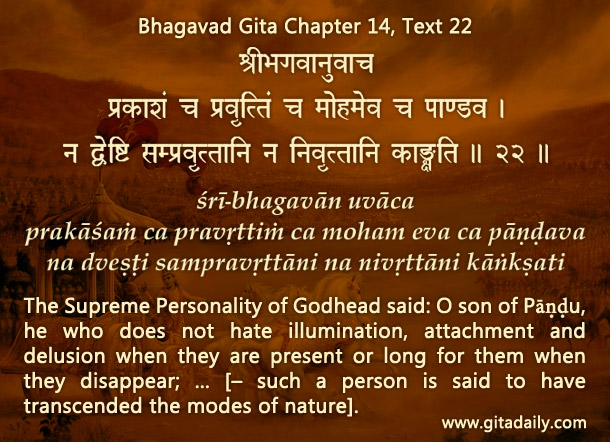You are not a negative thinker even if your mind is – “You are such a negative thinker.” We may receive this discouraging feedback if we tend to look at problems in a given situation. Such labels may make us wonder, “Is there anything intrinsically wrong with me?”
No, there isn’t. Because Gita wisdom explains that we are not our thoughts or even our way of thinking; we are souls, different from our bodies and minds, We are the thinkers of our thoughts, which arise in our mind largely in accordance with its nature. Pertinently, the Bhagavad-gita (14.22) urges us to become observers of our thoughts. Thereby, we can identify our mind’s features, including its default way of thinking: positive or negative.
Just as different bodies have different features, so too do different minds. Some bodies may have a sharp olfactory faculty; people with such bodies can thoroughly analyze smells that others barely notice. Similarly, some minds may have a sharp critical faculty; people with such minds can sense problems that others can’t. There’s nothing wrong with either set of people; they just have particular physical or psychological features. Those with a critical mind can use it to nip problems in the bud or misuse it to nag people to death.
Expertise in sensing both potentials and problems is needed to successfully complete any project. Consider book publishing, which is a collaboration between the creative mind of the author and the critical mind of the editor. The author finds potential ideas and develops them; the editor finds problems with the ideas and their development. Together, they transform a nascent idea into a refined book. Just as the editor uses their negative thinking ability constructively, so too can we.
Guided by Gita wisdom, we can be calmly confident that even if our mind tends to look at negatives, we needn’t go along with its thinking constantly. Being thus grounded, we can constructively channel our mind’s default way of thinking without being dominated or defined by it.
One-sentence summary:
Don’t identify with your thinking; identify your thinking so that you can direct it, not be directed by it.
Think it over:
- Why are we not our way of thinking?
- How can a critical mind be used or misused?
- Is there any feature of your mind that people label you with? How can you dis-identify yourself?
***
14.22: He who does not hate illumination, attachment and delusion when they are present or long for them when they disappear; … – such a person is said to have transcended the modes of nature.
To know more about this verse, please click on the image
Explanation of article:

Podcast:


Wonderful Interpretation of thoughts process. Very nice way to look at negative things with great positivity.
Thanks, happy to be of service.
JAPA changes thinking process
Comforting to read the segregation made between one’s thinking pattern that one may not be able to change and thinking about our thinking which one can attempt to change through our spiritual practices
Thanks for the well-articulated comment.